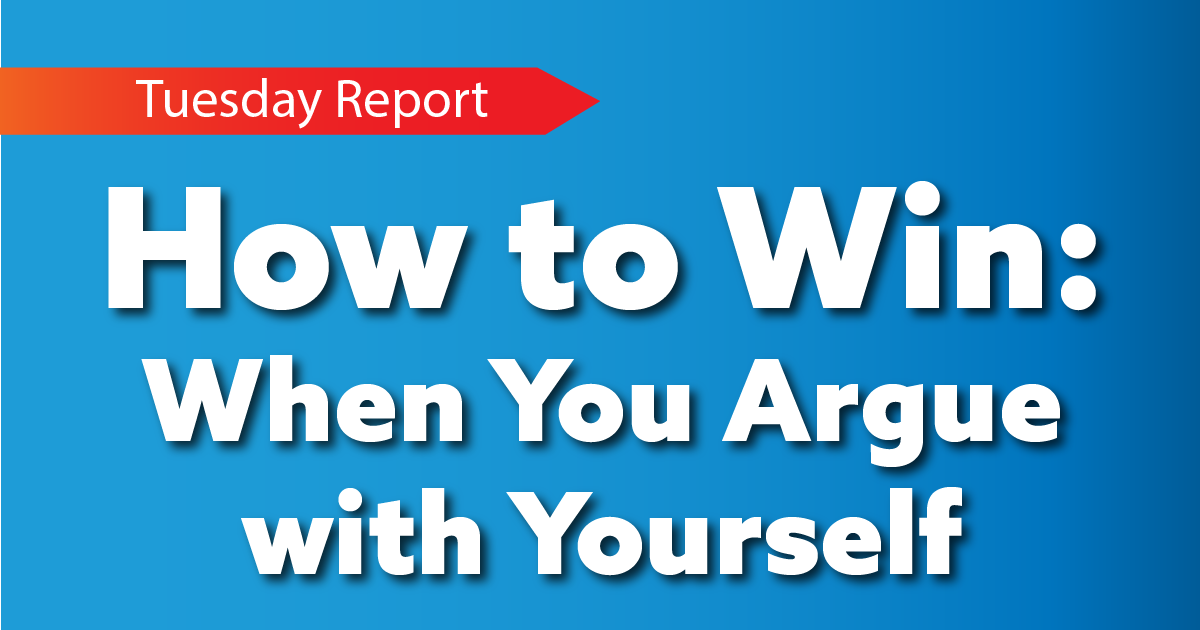Arguments happen—all day every day everywhere around us.
Disagreements, conflicts, and arguments are a fundamental part of human existence.
If you are part of any group that works to get things done, you’ll experience conflict. I think I’m good at conflict, but I avoid arguments. Yet because I have this huge, keen sense of always being right,😃 I do argue from time to time and these arguments can get out of hand.
But the biggest arguments I get into are with myself.
Sometimes these arguments with myself are fairly calm, but they can get pretty intense, sometimes heated. I have at least two points of view within me always popping in my mind and squaring off on my mental battleground.
Both voices make good sense–they present two valid positions.
The argument goes something like this:
The First Voice Begins:
“Today is your last shot to get this project done. If it takes until one in the morning, you have to power through.”
Then the second voice responds:
“Come on now. Pushing through on this project is creating your own artificial crisis. The more you burn the midnight oil, the longer it will take. If your project gets slowed down, there are others who can speed up—not just you!”
The first voice is angry and wants to go to the mat:
“She really criticized the way I’m managing the project even though we’re on time and knocking the ball out of the park. I’ve got to tell my boss about her outburst and make a statement to the team.”
The second voice argues for a calm measured response:
“Why wouldn’t you just let it pass? If you answer her, she’ll respond with something even more outrageous. Get over it. She’s not the sharpest knife in the drawer. Everyone already knows that.”
These arguments are endless in my head and can go on 24/7. The number of subjects is endless.
Which voice wins in these verbal battles?
How do I tip the balance from one side to the other?
How do I decide? Who is it that decides?
Here are some tools that can help you.
- Remember that Inner Debate Is Useful. When you’re debating within yourself, you are in your own mental supreme court. Your inner Supreme Court is the most important court in the world to you. It decides the rules of conduct for you.
In my case, the Chief Justice is Jack Speer.
So here’s the exercise I’d like you to do right now. Repeat out loud: “I [your name] am the Chief Justice of my Supreme Court.”
Claiming your place as Chief Justice of your own Supreme Court makes you, at last, the ultimate decider in whatever argument comes up within you.
All the people who come up in your mind in this debate are important to hear from, but you must put on your Chief Justice robes, decide the case, and never look back. You have the authority and the responsibility. Believe in your own authority. - Embrace Your Feelings. When you begin the inner debate, you’ll experience feelings regarding that decision-making that may jar you like a jolt of electricity. Your emotions want you to avoid the inner debate and run away until a different day. But instead of avoiding your feelings, it’s important to embrace them.
When I begin the debate in my mind about things I care about–career, family, values, and beliefs–my emotional reaction kicks in–fear, resentment, avoidance. That’s when I most need to connect with my emotions and their immediate reactions and assure myself that my emotions are real and important. Then my mind can guide me as I reason through the issue. - Accept Your Own History-Don’t Let the Past Dominate Today. Looming over every present-time mental debate is the power of the past. The inner voice tells me, “Don’t you remember you tried that last time? And what kind of disaster was that?” The past is important. As in any court of law, in your own inner Supreme Court, precedent is important. Although the precedent of past decisions and experience can guide you in your decisions today, we often view the past as if it were a living reality today. The precedents of the past are useful, but the actual events of the past are set in stone. You can love or hate your past, but you can’t change it.
Allowing the past to influence your decisions today is useless. Let’s move on. The pull of the past cannot obliterate the power and possibilities of today. That’s what’s called the “tyranny of the past.” Don’t fall for it. - Inner Alignment–the Key to Resolving Inner Conflict. Most of my inner arguments occur because I don’t agree with myself on the fundamentals–I haven’t clarified to myself what is most important to me, what I believe, and what I value.
In many, if not most, cases that’s the reason I have endless debates with myself. When I understand my values and goals, many of the issues that confront me will be guided by the fact that I know who I am and where I’m going. If I’m headed to Dallas from Austin, Texas I get to I-35 North and the rest is easy. We have to find the road we are traveling on with our key decisions and stick to the route.
When you sum it up, those four principles—acknowledging the value of the debate, embracing your feelings, accepting your history without being tyrannized by it, and aligning your decisions with your values—add up to a simple strategy to win battles with yourself: Lean into the debate and stay curious with you.






